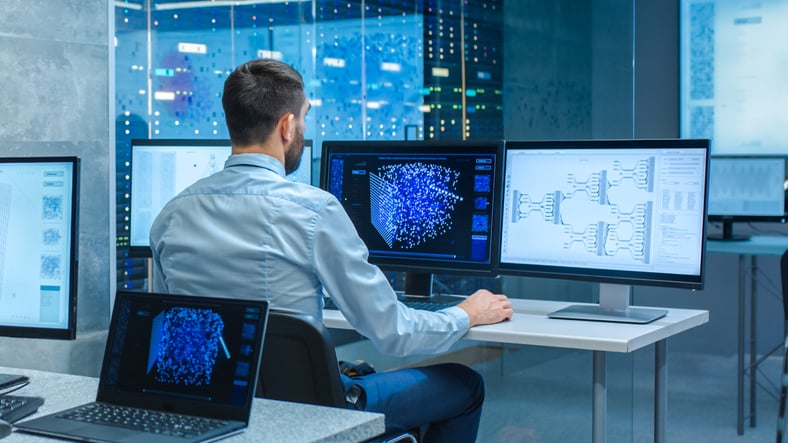With the rise in popularity of DevOps, specific roles in software development have become more prominent, for example, DevOps Engineers. When they decide to go even further in their careers, DevOps Engineers can level up to DevOps Architects. Due to their visibility and potential for impact on business outcomes, DevOps Architect roles are becoming a popular option for experienced tech professionals.
What do DevOps Architects do?
DevOps Engineers support the development process by working with teams throughout the software development life cycle (SDLC) to implement software systems. DevOps Architects take it a step further by designing software delivery platforms, systems, and frameworks and managing the implementation of those designs.
Responsibilities of DevOps Architects include:
- Ensuring efficiency in the SDLC
- Identifying and addressing problem areas
- Implementing DevOps-compliant channels
- Facilitating environments in line with continuous build frameworks
- Designing efficient software development processes
7 Traits of Excellent DevOps Architects
DevOps Architects have a unique position in the development life cycle. They possess extensive technical knowledge, DevOps engineer experience, strategic capacity, and can lead development teams where necessary.
DevOps Engineers can become DevOps Architects with enough experience, but to become a truly great one, they need more than just technical know-how.
Here are our 7 picks for traits to look out for in effective DevOps Architects.
1. Value Continuous Learning
Engineers can spend years in a role and still learn new things every day. What’s more, new tools, programming languages, and technologies are constantly being developed. DevOps Architects who actively seek out learning opportunities to expand their knowledge are a great asset to development efforts.
Whether they’re learning to use new software tools and programming languages or improving their existing skills, continued learning is always a good sign for a DevOps Architect.
2. Prioritize Sharing Knowledge
On the topic of learning, the best DevOps Architects understand the need to share knowledge. Rather than hoarding new information, they are keen to share what they have learned with other team members.
Excellent DevOps Architects aren’t afraid to get their hands dirty and are happy to share what they know with the team, whether it be in pair coding, code reviews, or one-on-one meetings.
3. Are Highly Analytical
Software development can be a complicated process. Multiple teams, data streams, code segments and modules, are constantly in a state of flux. Identifying where sticking points in the process can be automated or otherwise improved takes a keen analytical mind and no small measure of creative problem-solving.
Great DevOps Architects have honed their skills picking apart complex systems to reveal inefficiencies and opportunities for optimization.
4. Actively Solve Problems
When issues arise in development, it’s not uncommon for some to “kick the can down the road.” DevOps as a methodology is clear on the need for accountability and ownership of products; this means owning successes as much as challenges.
DevOps Architects who find and nip issues in the bud end up saving companies time and money. They see the need to address issues early on and take the necessary steps to resolve them, either on their own or as part of a team.
5. Focus on Building Collaborative Teams
As experienced proponents of DevOps, understanding the needs and limitations of disparate teams is an important part of the role. It allows DevOps Architects to better understand the challenges facing development from start to finish.
DevOps is built on the idea of collaboration to optimize software development. The closer DevOps Architects are to teams throughout the development life cycle the more they can facilitate collaborative cultures.
6. Have Strong Thought Leadership and Management Skills
Thought leadership is necessary for anyone in a technical leadership position. DevOps Architects need to be visionaries for their organizations. They plan the way ahead and secure team buy-in to make the development process better for everyone.
To see their vision realized, they need to manage the talent within their networks efficiently to keep development running smoothly.
7. Communicate Effectively with Tech and Business Stakeholders
Great DevOps Architects need to leverage their communication skills to share ideas in a way that encourages confidence and cooperation. As the minds behind SDLC system designs, DevOps Architects need to get sufficient buy-in from both their technical teams and their business stakeholders. Communicating how their plans can improve processes is a critical skill.
Get the best out of your DevOps Architects
DevOps Architects create better processes for delivering higher quality software products faster. They must be able to identify areas for improvement in the SDLC, propose solutions, and lead teams to implement them. Overall, they can make huge impacts on development, ultimately improving software quality and ROI. That’s why it’s important to choose the best candidate for your organization when building capacity for your DevOps teams. Learn more about DevOps tools and practices here.
About the author
Alvaro Marinetto
Working as Foreworth’s, Development Director, Alvaro manages the day-to-day activities of the development team. He helps steer the direction of the company’s new feature development as well as their maintenance efforts.
More info →


What do you think? Leave us your comments here!